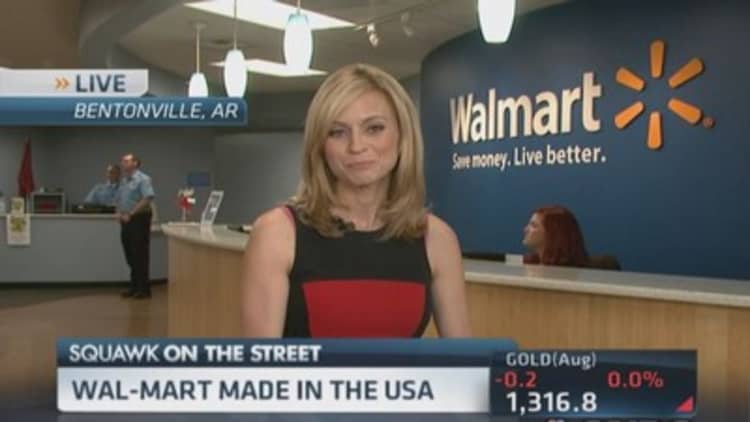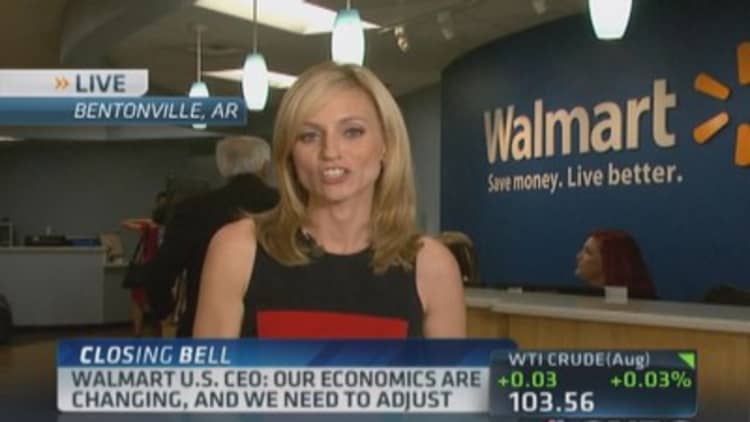
Wal-Mart Stores opened its doors Tuesday to more than 500 small businesses to make good on a pledge to spend an additional $250 billion dollars by the year 2040 in an effort to bring manufacturing back to U.S. shores.
Aluf Plastics, a garbage bag manufacturer based in Orangeburg, N.Y., presented several of its product lines to senior buyers at the nation's largest retailer in the hope of inking a distribution deal with the retailer.
Read MoreJ.Crew under pressure for size 000
"I'm a little nervous, it's a big piece of business, but I'm excited because I see what it's going to do for everybody," said Joe Rosenberg, vice president of Sales for Aluf Plastics. "It's a win-win for consumers and for us and because of that we'll be able to hire more people, have a lower unemployment rate here in the economy and with that comes additional equipment, packaging, machinery. All of our suppliers are going to have benefits from that."
Aggressive pricing has always been a hallmark of Wal-Mart's strategy, and some critics have said this practice has made it difficult for companies manufacturing in the U.S. to stay profitable. But Wal-Mart said it expects the tide is changing.
"Economics are starting a generational shift with the labor components rising in Asia," said Bill Simon, CEO of Walmart U.S. "Demand for products is rising in Asia; transportation costs increasing; and lower energy costs domestically, there are categories that are already less expensive to manufacture in the U.S."
Read More'Kashing in' on the Kardashian klout
Aluf Plastics, in business for 37 years, has had success in keeping its manufacturing costs low by going green and investing heavily in new technology to increase operating efficiency. But it hasn't always been easy.
"Overseas product is a strong source of competition for us so we are constantly on our toes to take advantage of new technology to counteract that difference. For the most part over the last two to three years, the gap has narrowed so we can manage it better with local manufacturing, local deliveries and new technology improvements," Rosenberg said.
Aluf also recycles roughly 50 million pounds of industrial plastic waste a year that would otherwise go to the landfill as well as recycling 25,000 gallons of water every day used in their manufacturing.
Read MoreIt's time to go bargain hunting for retail stocks
In addition to taking advantage of lower manufacturing costs at home, Wal-Mart hopes the "Made in the USA" product push will shore up sluggish sales and traffic in stores as the nation's unemployment rate continues to decline.
"I think it's going to take a while, six months or a year, for those numbers to balance out," Simon said. "You'll see a drop in the [unemployment] rate, and then as more people come back into the work force, that might change again. Hopefully, after six years, we start to gain traction in the U.S."

Traction in the economic recovery is being seen at the higher-income segments of the population, but it is more challenging currently for the lower-income consumer, who is Wal-Mart's core customer base, Simon added.
But for Rosenberg and Aluf Plastics an improving economic picture looks like it might be just around the corner. The company was picked for a test distribution deal that will put its Ultrasac garbage bags on shelves at 200 Wal-Mart stores this November.
"This will take us to the next level, doing business with Wal-Mart will really put us on the map," Rosenberg told CNBC.
The deal was one of potentially hundreds Wal-Mart solidified Tuesday at the "Open Call," according to company spokespeople.
—By CNBC's Sabrina Korber


